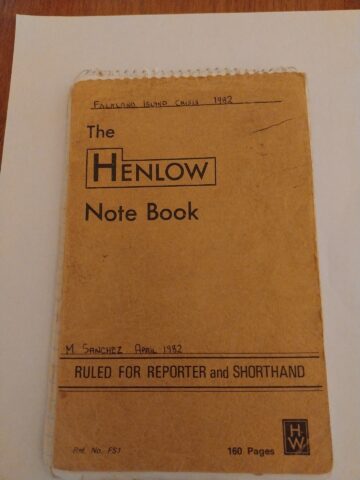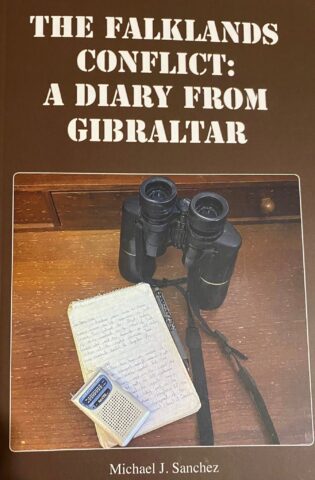A Falklands Diary
By Michael Sanchez
I still cannot fully explain why I decided to start the diary.
At first, everyone was taken aback by the invasion. Many people had not even heard of the Falkland Islands and had many scrambling through atlases to find the position of these relatively unknown British possessions in the wild South Atlantic, 8000 miles from mainland Britain. Perhaps there were several factors involved in my initial decision to commence jotting down a few lines in a shorthand note book.


As the conflict developed a few days after the Argentine invasion, I suspected that Gibraltar would somehow be involved in any subsequent military intervention should the government of Margaret Thatcher decide to recover the Islands.
Coincidentally a Royal Navy Task force was exercising in the area close to Gibraltar so it was logical to think, in my view, that some if not all these warships and auxiliaries would be deployed to the South Atlantic in response to the Argentine aggression.
I have always loved the sea. Since my early childhood I was mesmerised by the sounds of crashing waves, the gurgling of water between rocks and crevices along our shoreline, the ebb and flow of tides and the swirling currents that created innumerable patterns on the surface of the sea, both beautiful and deadly at the same time.
I used to spend hours listening to the unintelligible language of salt water playing hide and seek in and out of nooks and crannies formed by the incessant motion of the surf making landfall on our coastline.
It was quite a feat to collate information for the diary on a day to day basis especially when you had a full time job.
I spent hours listening to the radio, reading newspapers and watching television. Those were the only media available back in those days before the age of information technology that now invades our homes and lives every second of the day. I did not have the benefit of today’s social media that churns out news stories in the blink of an eyelid. It was hard work.
I tried to balance the story that was slowly building up during the early days of the conflict but it proved a very difficult task as the flow of information out of Argentina and nearby Spain was unreliable.
My main sources for the diary inevitably came from BBC radio news bulletins and traditional UK newspapers. GBC TV recounted footage of the events as it affected Gibraltar during their news broadcasts. Local newspapers like the Gibraltar Chronicle and Panorama took up the rest of my extensive search and compilation of information for the diary.
At first I struggled to present a balanced presentation of the facts as recounted by both sides of the conflict.
Much as I tried, I had to abandon any material sources from Argentina and Spain as the press of these two nations sought to dramatically misrepresent facts and events. The information coming out was totally unreliable, unashamedly biased and packed with untruths.
There was no objective reporting and the manner that it was presented to the public was astounding in itself. According to these outlets HMS Hermes was severely damaged countless times and HMS Invincible was sunk during an air raid and missile attack. Until today, Argentina still claims to have sunk HMS Invincible despite irrefutable evidence to the contrary.
On the other hand, British reputable and seasoned journalists were embedded on the flagship HMS Hermes and other warships, the output of news was reliable as far as security constraints allowed.
The MoD appointed the late Ian McDonald to present daily briefings of events as they transpired in the South Atlantic. He became the focal point of information management during the conflict which he delivered in his personal style and inimitable voice.
There was a lot of disinformation and misinformation intertwined between factual news. This was unavoidable and part of the strategy to keep your enemy guessing about your intentions and try to make them look the other way. This can be reflected by several entries in the diary that are inaccurate both in dates and content.
Quite a lot of new information has unfolded as the years have passed after the recapture and return to British sovereignty of the Falkland Islands. Researchers and authors have had the benefit of interviewing many people involved in the war, from politicians, service personnel to the ordinary person in the street. Government archives have been released into the public domain.
My diary was put together with facts as reported at the time. No more, no less. I still think that the complete political truth will never be known.
What is clear to me is that those dark days in the South Atlantic during April to June 1982 were avoidable.









